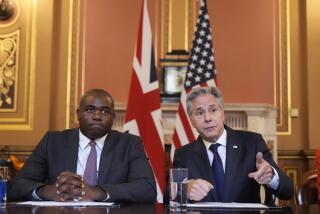Administration Defends Bosnian Arms Policy
- Share via
WASHINGTON — Clinton administration officials who decided in the spring of 1994 not to object to Iranian arms shipments to Bosnia were faced with a “military urgency” and a strategic “imbalance in favor of the Bosnian Serb forces” that threatened the survival of the Bosnian Muslim government, a senior State Department official told Congress on Tuesday.
In the first public congressional hearing on the administration’s secret Iranian arms policy, Peter Tarnoff, undersecretary of state for political affairs, defended the administration’s decision, saying that it was the best option available at the time to help the Bosnians fend off Serb aggression while still not disrupting America’s fragile diplomatic arrangements in the region.
The decision to acquiesce in Iranian arms shipments was a way to ensure that the Bosnians received military aid while also allowing the United States to avoid “crossing the line of unilaterally abrogating a binding [U.N.] Security Council resolution by providing arms to the Bosnian government directly or indirectly,” Tarnoff said.
“The good news was that the valiant armed forces of Bosnia did manage to hold out and hold on to their territory,” Tarnoff said in his appearance before the House International Relations Committee. He also said nations in addition to Iran provided arms to Bosnia.
Also Tuesday, congressional sources said the House Republican leadership is seriously considering creating a special committee to investigate the administration’s Iranian arms policy. Several House committees have already begun to investigate the issue, but sources say the House leadership wants to consolidate its effort. The move would also allow the GOP leadership to handpick committee members who are most interested in the issue and most adept at mounting an investigation.
The committee would look into reports first raised by The Times that President Clinton had secretly given a green light to Iranian arms shipments to Bosnia in April 1994.
At the time, Croatian President Franjo Tudjman had asked U.S. officials how Washington would respond to the creation of an Iranian arms pipeline to Bosnia through neighboring Croatia. Clinton decided that Tudjman should be told that the United States would not object, and the arms pipeline opened quickly.
The House intelligence panel announced that the White House has refused to turn over a copy of a report on a secret six-month investigation into the policy by the White House’s Intelligence Oversight Board, which looks into wrongdoing in the intelligence community.
Last week, oversight board Chairman Tony Harrington refused to testify under oath during a closed Senate committee briefing on the matter. As a result, the House committee required Tarnoff to be sworn in and testify under oath on Tuesday.
The House appears to be moving more aggressively than the Senate to investigate the issue. Giving the House the lead provides Senate Majority Leader Bob Dole (R-Kan.), the presumptive Republican presidential nominee, some political distance from the matter, yet still allows the GOP to pursue an investigation that could yield political dividends for Dole.
Administration officials and others argue that the Republican leadership in Congress has latched onto an old story to exploit it during the presidential campaign.
In an effort to combat the Republican attacks on the policy Tuesday, Tarnoff stressed that Congress received U.S. intelligence reports documenting the existence of Iranian arms shipments into Bosnia.
“Congress was aware of the Iranian arms shipments to Bosnia at the time,” he said. U.S. intelligence reports tracking the shipments “were contained in an intelligence document that is provided on a daily basis to the relevant congressional committees.”
He said the U.S. intelligence community began to report on Iranian cargo flights into Croatia in May 1994--shortly after the United States had given the green light to Tudjman.
Tarnoff acknowledged that he does not know of any instance in which Congress was notified of the U.S. role in sanctioning the arms pipeline. Dole and House Speaker Newt Gingrich (R-Ga.) have said they were never informed by the president, even though they had numerous private meetings in the Oval Office with him on Bosnia.
Tarnoff, faced with stiff questioning from committee Republicans, declined to discuss many details of the administration’s policy deliberations, saying that he would do so only in a classified briefing with lawmakers.
The third-highest ranking official in the State Department, Tarnoff acknowledged that he was told of the policy only after the president had made the decision. He said he did not know the details of Clinton’s deliberations with senior advisors.
Congressional sources say that the committee wanted Deputy Secretary of State Strobe Talbott, who was directly involved in the policy decision, to testify, but the State Department made only Tarnoff available.
Yet Tarnoff said he agreed with the policy decision, and made it clear the White House had little choice.
Under pressure from America’s European allies, the president was opposed to congressional efforts to unilaterally lift the U.N. arms embargo and to provide U.S. arms to the Muslims.
European nations with peacekeepers in Bosnia, notably Britain and France, threatened to withdraw their forces from the region if the U.S. lifted the arms embargo.
If that had happened, Clinton administration officials were convinced that the United States would then have had no choice but to send in U.S. troops to take their place to try to keep the peace.
More to Read
Get the L.A. Times Politics newsletter
Deeply reported insights into legislation, politics and policy from Sacramento, Washington and beyond. In your inbox twice per week.
You may occasionally receive promotional content from the Los Angeles Times.










